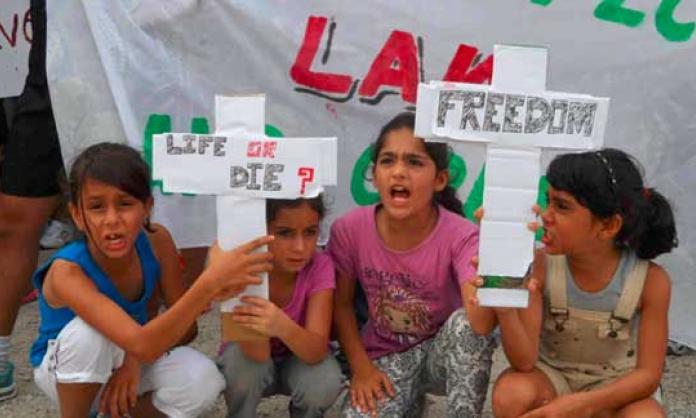Protests, hunger strikes, sexual assault revelations, whistleblowers, reviews, spin doctors, resistance, repression. The situation on Nauru is spiralling out of control, and the only response of the Australian government is further cruelty.
It is proposing new laws to give immunity to immigration officers who use force against asylum seekers in detention centres. The Migration Amendment (Maintaining the Good Order of Immigration Detention Facilities) Bill would protect any “authorised officer” who uses “such reasonable force as the authorised officer reasonably believes is necessary”, as long as it is “to prevent action in an immigration detention facility” that “disturbs the good order, peace or security of the facility”.
As Guardian journalist Paul Farrell points out, “reasonable force” includes grievous bodily harm, “which courts have held to mean injuries that lead to serious or permanent disfigurement”.
Further, asylum seekers would have little recourse to personal injury claims. The bill proposes that “no proceedings may be instituted or continued in any court against the Commonwealth in relation to an exercise of power under section 197BA if the power was exercised in good faith. This section has effect despite anything else in this Act or any other law.”
The parliamentary joint committee on human rights has pointed out that “the bill … provides an ill-defined and extremely broad authorisation for the use of force by IDSP officers”. It also notes that the laws give detention officers more legal rights than police officers and prison guards.
It’s clear why the government is bringing in this bill. Ever since the detention centre was installed on Nauru, refugees have been resisting the atrocious conditions on the island. Ali, a refugee from southern Iran, told the Guardian, “This is jail. Even God can’t help you here.”
Those who have been resettled on the island face increasing violence. On 31 March an Iranian refugee was attacked by two local Nauruans and had his hand and upper arm slashed by a knife. Another refugee was bashed a day earlier.
When refugees stand up for themselves, they are met with the full force of the government’s security forces. During March, almost 200 refugees, including children, were arrested after staging a peaceful protest, which was attacked by locals.
The Nauruan government has introduced a law requiring protesters to submit an application to the police commissioner seven days before an action. If they fail to do so, or if the police commissioner rejects their application and the protest goes ahead, they face two years’ imprisonment and/or a fine of $3,000. The amendment was announced shortly after refugees organised a solidarity action in support of Saeed Hansonloo, an Iranian hunger striker in Perth.
This strengthening of the security apparatus by both the Nauruan and Australian governments has not gone unchallenged. Hundreds of refugees on Nauru staged a protest in defiance of the new anti-protest law.
Resistance has had an effect. Growing numbers of staff and former staff from Nauru are speaking out. An open letter signed by current and former Save the Children and International Health and Medical Services staff said:
“The government of Australia and the Department of Immigration and Border Protection have tolerated the physical and sexual assault of children, and the sexual harassment and assault of vulnerable women for more than 17 months.”
Others working within the detention system are hardening their attitudes. The Facebook comments of Timothy William Haye, a Serco client service and security officer, reveal deeply racist views. As Iranian refugee hunger striker Saeed Hansonloo was getting closer to death, someone asked for news of his situation to be passed on to his brother, currently in the Christmas Island detention centre. Haye commented: “No. Just let him suffer.”
This inhumanity is in line with the whole structure of the detention system; it’s the logical outgrowth of the government’s policy. Haye is exactly the kind of person the government wants to employ on Nauru and Manus Island – not bleeding hearts who will go whining to the media when “things happen”.
For refugee rights supporters on the mainland, the task is clear: we must show our support to the refugees struggling for their freedom on Nauru and continue working to end the barbaric system of mandatory detention.









